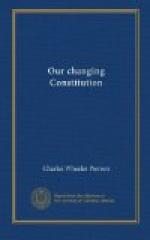[Footnote 1: “An Act to protect trade and commerce against unlawful restraints and monopolies,” approved July 2, 1890.]
The act was nearly shipwrecked at the outset on the first of these questions. In the famous Knight case,[1] the first case under the Sherman Act to reach the Supreme Court, it was held that the transactions by which the American Sugar Refining Company obtained control of the Philadelphia refineries and secured a virtual monopoly could not be reached under the act because they bore no direct relation to interstate commerce. The effect of this decision naturally was to cast doubt upon the efficacy of the statute and encourage the trust builders. Perhaps the case was rightly decided in view of the peculiar form in which the issues were presented by the pleadings. In the light of later decisions, however, it is safe to assert that the Court would now find little difficulty in applying the remedies provided by the Sherman Act to a similar state of facts, properly presented. While no prudent lawyer would care to attempt a comprehensive definition of what constitutes interstate commerce, it may at least be said that the tendency of the courts has been and is toward a constant broadening of the term to meet the facts of present-day business.
[Footnote 1: United States v. E.C. Knight Company, 156 U.S., 1.]
The other question—Did the Sherman Act change the common-law rule as to what restraints and monopolies are forbidden?—has been even more troublesome. The lawyers in Congress who framed the law believed that it did not. This is the testimony of Senator Hoar in his Autobiography, and as he was a member of the Senate Judiciary Committee which reported the act in its present form, and claims to have drawn it himself, his testimony is entitled to belief. The Supreme Court, however, in this particular went further than was expected. In the Trans-Missouri Freight Association case,[1] which reached the Supreme Court two years after the Knight case, that tribunal decided by a five-to-four majority that the words “every contract ... in restraint of trade” extended the operation of the law beyond the technical common-law meaning of the terms employed so as in fact to include all contracts in restraint of interstate trade without exception or limitation. This theory was strongly combated by the minority of the court, speaking through Justice (afterwards Chief Justice) White, and was denounced by many eminent lawyers, notably the late James C. Carter, then leader of the New York Bar, who predicted that sooner or later it must be abandoned as untenable. Their protests were well founded. The theory, carried to its logical conclusion, would have prohibited a great variety of transactions theretofore deemed reasonable and proper, and would have brought large business to a standstill. As a matter of fact, it was never carried to its logical conclusion, and six years later it was expressly repudiated by Justice Brewer; one of the five, in the course of his concurring opinion in the Northern Securities case.[2] Justice Brewer said that while he believed the Trans-Missouri case had been rightly decided he also believed that in some respects the reasons given for the judgment could not be sustained.




